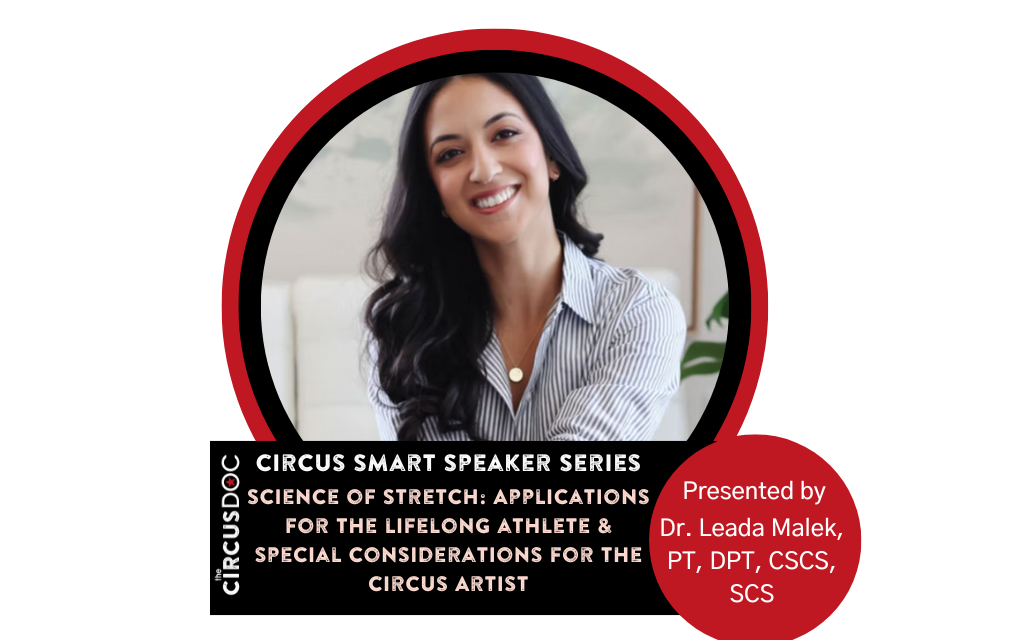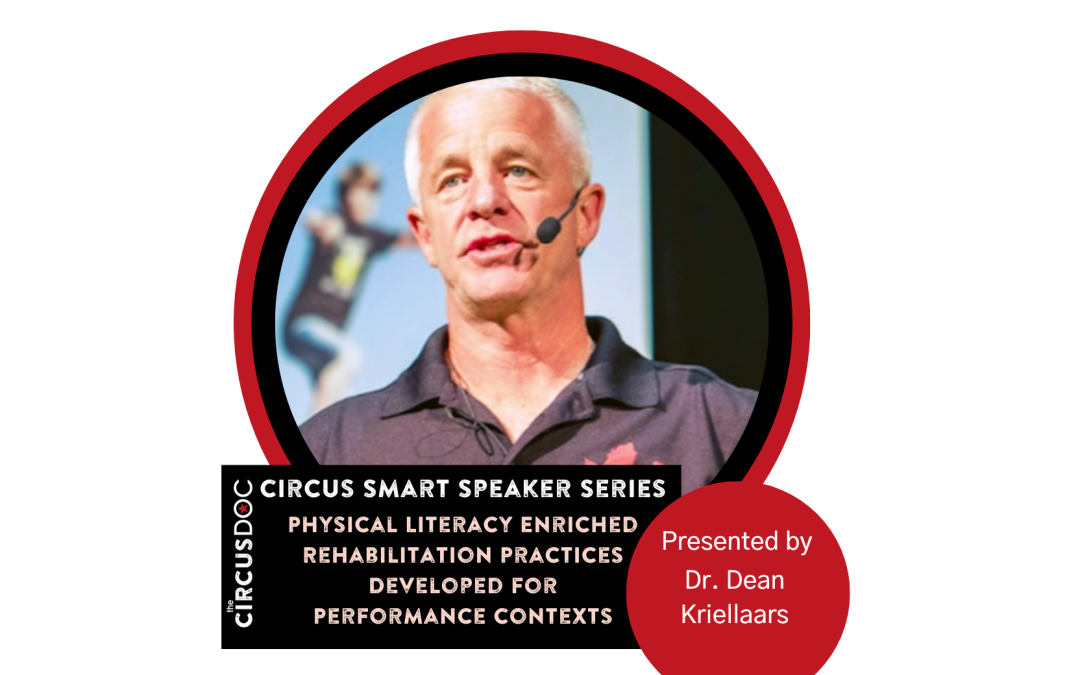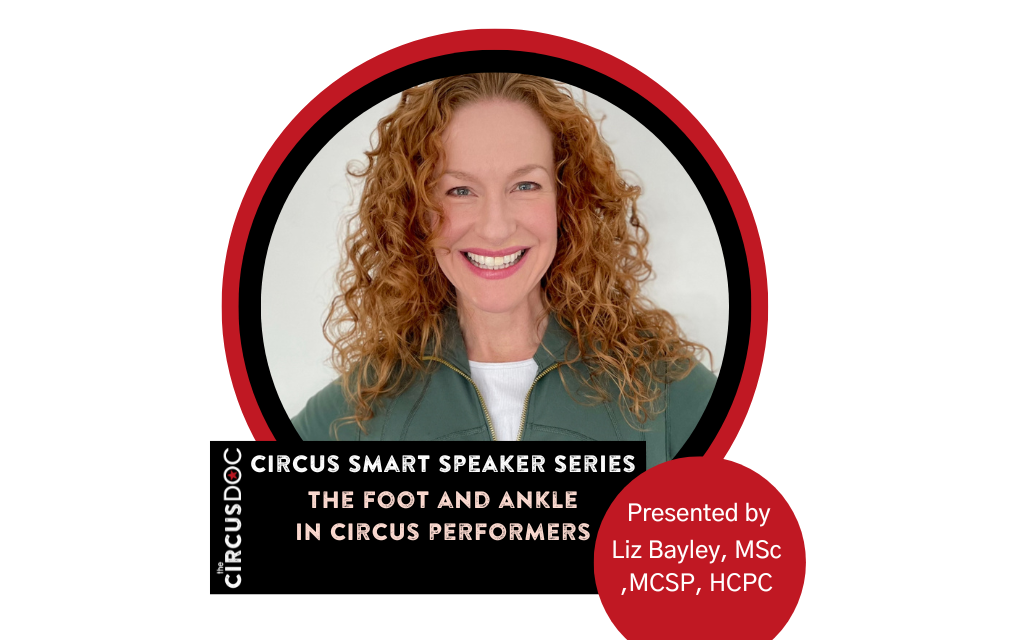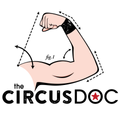IN-PERSON: ARTIST WORKSHOPS
AVAILABLE WORKSHOPS
Latest: Artist Workshops

May Circus Smart Speaker Series: Science of Stretch: Applications for the lifelong athlete & special considerations for the Circus Artist
Join DPT and author of “The Science of Stretch”, Dr. Leada Malek for this breakdown of modern stretch science and all its real world circus considerations! Stretching...

April Circus Smart Speaker Series: Physical Literacy Enriched Rehabilitation Practices Developed for Performance Contexts
Join neuroscientist and world renowned expert in physical literacy for this session on physical literacy enriched rehabilitation practices. This session will provide...

March Circus Smart Speaker Series – The Foot and Ankle in Circus Performers
Join physiotherapist and artist-athlete care specialist Liz Bayley for the March Circus Smart Speaker Series lecture covering all things foot and ankle from...
Love your Circus Shoulders: Keeping them strong for hanging, handstands, and beyond (1.5hrs)
Shoulder pain is one of the most common complaints for all circus artists. From minor niggles to major injuries, we will discuss the main reasons they happen. We’ll start by discussing the basics of how shoulders work to provide us with maximum mobility while still protecting the joint. Then we’ll figure out the common way things can go wrong and then moving into how to prevent them. We’ll finish with some of my favorite exercises for shoulder health and longevity. You’ll come away with a better understanding of how to prepare your shoulders for safe strong movement and improve your mobility in the process.
CIRCUS TRAINING TO MEET YOUR GOALS AND PREVENT INJURIES(1.5 HOURS)
Harness the power of the most up to date sports science to understand how to focus and structure your training to improve your performance and prevent injuries. We will answer common questions including (but definitely not limited to!); What is the best way to warm up and why is it important? How can reach my goals? How should I prepare for an upcoming performance or workshop? What should my daily/weekly/monthly training look like? And of course answer any questions you have along the way!
Returning to Training after a Long Break (1 Hour)
Hanging may sound like a simple building block of movement but holding an artist’s full body weight at end range of motion is a challenge for any shoulder.
Through lecture, practical examples, and guided case studies you will:
- Learn how strong supported shoulder alignment helps an artist improve their performance and achieve their goals
- Identify good hanging form and know why it is important
- Recognize common errors and learn how they relate to the rest of your assessment
- Have a tool you can implement immediately to support the next artist/athlete you see
AND
- Be the resource in your community that all the aerialists are talking about
Prerequisites: Solid background in shoulder anatomy and a desire to work with circus artists
Hanging Analysis of the Shoulder (1 Hour)
Hanging may sound like a simple building block of movement but holding an artist’s full body weight at end range of motion is a challenge for any shoulder.
Through lecture, practical examples, and guided case studies you will:
- Learn how strong supported shoulder alignment helps an artist improve their performance and achieve their goals
- Identify good hanging form and know why it is important
- Recognize common errors and learn how they relate to the rest of your assessment
- Have a tool you can implement immediately to support the next artist/athlete you see
AND
- Be the resource in your community that all the aerialists are talking about
Prerequisites: Solid background in shoulder anatomy and a desire to work with circus artists
HANGING TOUGH: SHOULDER HEALTH FOR THE AERIAL ARTIST (2 HOURS)
Aerial artists spend a lot of time with our arms over our heads, which can lead to pain and injury. Our shoulders are the most mobile joint in our bodies and our greatest aerial tools, but also the part of the body that is most at risk among aerialists.
This class focuses exclusively on the shoulder: the bio-mechanics of how it works and how to use it safely through its full range of motion. Learn the best techniques for hanging, smooth inversions, and levers, as well as the secrets of one-arm skills.
* If you’re interested in this workshop and “Hips Don’t Lie” you might just want to book the intensive training “Work With Your Body: Practical Anatomy for Aerial Artists”. These two workshops can be stand alone sections as requested but are built in to the intensive.
THE HIPS DON'T LIE: CONTROLLING THE CORE IN AERIAL ARTS (2 HOURS)
When you’re suspended in the air, the only thing you can count on is your core. This class explores the point where all of our aerial movement begins, and helps you understand the biomechanics and sequence of your trunk muscles and hip joints.
This class will help you build functional strength and flexibility, deepen your splits and straddles, invert with more ease and grace, and prevent common hip injuries and back pain
* If you’re interested in this workshop and “Hanging Tough” you might just want to book the intensive training “Work With Your Body: Practical Anatomy for Aerial Artists”. These two workshops can be stand alone sections as requested but are built in to the intensive.
CREATING A TRAINING PLAN: PREVENTING INJURY AND SPEEDING RECOVERY (2 HOURS)
Create plans for your students that allow them to avoid injury and achieve their goals. By understanding the science behind training programs your students won’t fall victim to injuries the week of the show or feeling like they are going to pass out when they run their act. This class explores what the body needs to become a strong, flexible, and dynamic aerialist.
Help your students learn how to recognize the difference between muscle soreness and genuine injury. Learn how to educate them to respond to each and how to help them return to training when they have been away from training. Learn to recognize the signs of concussion and when to seek help.
INVERT THIS: THE AERIAL ART OF TURNING UPSIDE DOWN (2 HOURS)
Learn how your core, hips, and shoulders work together to turn your body upside down. Figuring out which muscles are working, when, and why is the goal of this course. We will answer the questions of
Why are inversions hard for me?!?
Why do my hips drop?
How can I work on progressions to make them easier?
When are my shoulders supposed to close?
Once you understand how an inversion is supposed to work, we will discuss common mistakes and how to fix them to make everything from tuck-ups to straight-arm straddle-ups and even levers achievable.
